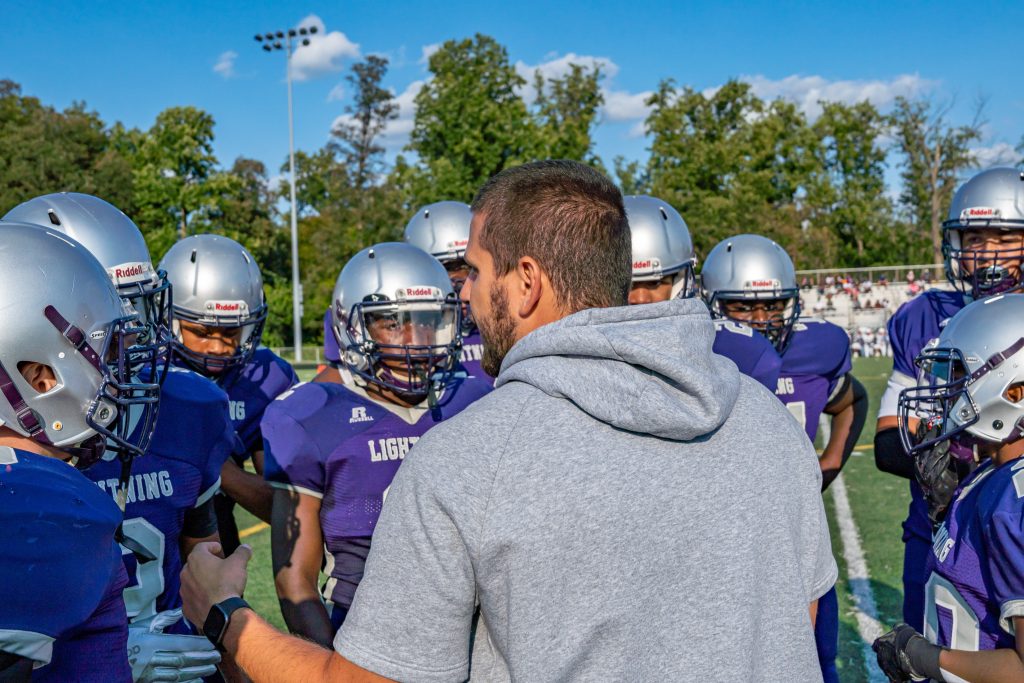How to Become a College Football Coach
College football coaches mentor players, strategize for upcoming games, and plan practice routines.
They must also remain knowledgeable about new sports trends and understand changing NCAA rules that directly impact their team. To become a college football coach, you must complete postsecondary education and obtain licensure or certification.
A different set of eligibility requirements will apply to each program. Some may require previous playing experience or related educational background.
Below you will find information on how to become a college football coach at the collegiate level.
Keep reading to learn more!
What You’ll Need to Become a College Football Coach.
Before becoming a college football coach, you’ll need to meet a few basic requirements.
First, you’ll need a bachelor’s degree from a regionally accredited college or university.
Next, you’ll need to have completed a postgraduate degree program that includes formal coursework in coaching theory and practice. If your specific program doesn’t require a master’s degree, you may still want to consider pursuing one.
A master’s in coaching will provide you with more formalized coaching instruction and allow you to specialize in a specific area of coaching. It will also help you stand out from other candidates and give you the knowledge necessary to succeed as a college football coach.
Coaching Certification and Licensing.
It’s important to keep in mind that coaching licensure requirements vary by state.
You must obtain a coaching license from your state’s governing body to coach at the collegiate level. While licensure requirements vary, most coaching organizations will require you to complete a course of study and pass an exam.
Contact the state’s governing athletic organization before you enroll in a coaching program to find out what is required for licensure in your state.
Once you’ve obtained a coaching license, you will maintain it by completing a certain amount of continuing education credits every year.
By doing this, you’ll ensure that you’re up-to-date on current trends, coaching techniques, and any new regulations that the NCAA introduces.
Gain coaching experience.
Suppose you’re looking to become a college football coach.
In that case, it’s a good idea to gain coaching experience in a lower collegiate or high school setting before applying for an assistant coaching position at the college level. You can do this by volunteering to coach at your child’s high school or college.

You can also seek paid coaching opportunities at the youth or high school level. If you want to become a college football coach, you’ll also need to show evidence of strong leadership skills and be able to maintain a positive relationship with your players.
You’ll need to be able to handle intense pressure and stay organized with a busy schedule. You’ll also want to show potential employers that you are committed to the sport and willing to learn and grow.
Learn the Basics of Coaching.
- Take a course in coaching. Many colleges and universities offer classes in coaching so that you can learn the basics of the sport from an expert.
- Learn from a coach. Even if you don’t take a formal course, you should get as much experience on the field as possible by working with college coaches at any level. (high school is best).
- Read books about coaching techniques and strategies for football players, including how to coach specific positions like defensive back or quarterback. Look for these books at libraries or bookstores.
- Watch videos on coaching techniques and strategies for football players, especially those that cover specific positions such as defensive back or quarterback. You can find these videos online through sources like YouTube, social media platforms (like Twitter), websites dedicated solely to providing educational content, such as Lynda or Udemy, or even your university’s website if it has one!
Bachelor’s Degree in Coaching
If you plan to pursue an entry-level coaching position in one of the major collegiate sports, you will likely be required to have a bachelor’s degree in a coaching-related field.

Earning your degree can help you become licensed in your state and gain hands-on experience as you work towards becoming an assistant head coach. If you seek a position as an assistant coach, you may need a kinesiology or athletic coaching degree. Earning a degree in one of these fields will allow you to obtain licensure and gain coaching experience.
Getting a master’s degree in kinesiology as a coach
There are many different types of master’s degrees in coaching, such as kinesiology and exercise science.
Some institutions might offer football-specific programs, while others may require you to take general coursework in addition to a related area. With any program, you’ll need to balance your classwork with being involved and active in other aspects of your football career, but with the right amount of dedication, there’s no reason you shouldn’t be able to succeed both on and off the field.
Kinesiology for coaches covers many topics, including biomechanics, exercise physiology, and nutrition. Understanding these topics can help coaches design training programs that are tailored to their athletes’ needs. A master’s degree in kinesiology can be beneficial for coaches in a variety of ways.
This degree can provide coaches with a greater understanding of how the body works and how to train athletes properly.
Furthermore, a kinesiology degree can give coaches a better experience in preventing injuries and rehabilitating injured athletes.
Master’s Degree in Coaching
It’s a good idea to pursue a master’s degree in coaching to prepare for the rigors of collegiate coaching.
Some universities require assistant coaches to have a master’s degree, even if their initial job posting only asks for a bachelor’s degree. Earning a master’s degree in coaching can help you stand out from other applicants and give you the knowledge necessary to succeed as a college football coach.
It will also allow you to specialize in a specific coaching field, strength training, or nutrition, which may be required for certain programs.
Final Thoughts
It will take a lot of work, but you can become a college football coach if you are dedicated and ambitious enough to make it happen.
As a college football coach, you need to be willing to work hard and deal with rejection. You will have many doors closed in your face before you can find the right fit for your skills. You must also be able to take criticism and motivate yourself when things aren’t going well. If you’re not willing to accept failure, becoming a college football coach will never be in the cards.
You’ll need to work with others if you want any chance at success as a collegiate coach. It’s not all about being good at your job; it’s also about communicating effectively with other people on the staff and players alike.
Finally, remember that diligence and perseverance are key. You will not become a college football coach overnight, but with hard work and proper preparation, you can do it.
Jobs related to this :
Location: CENTRAL REGION
Location: SOUTHEAST REGION
Location: NORTHEAST REGION
Location: WEST REGION


